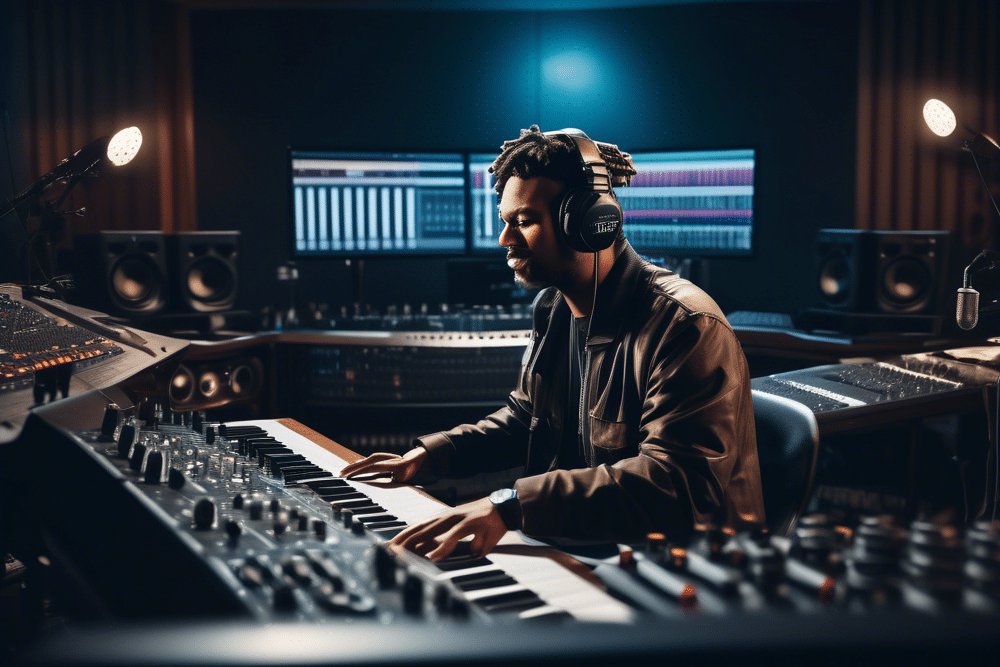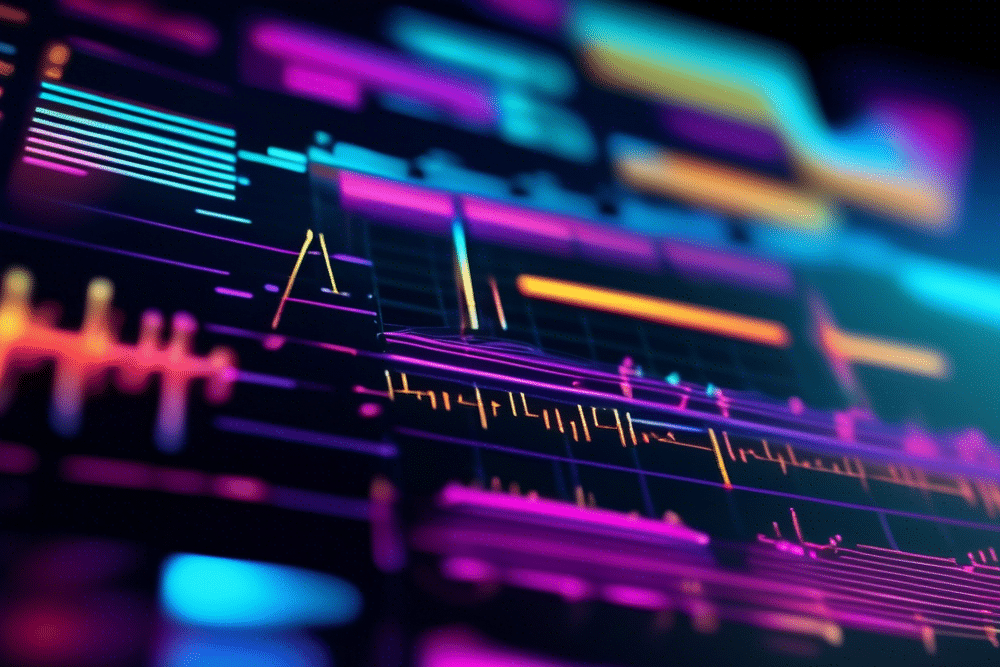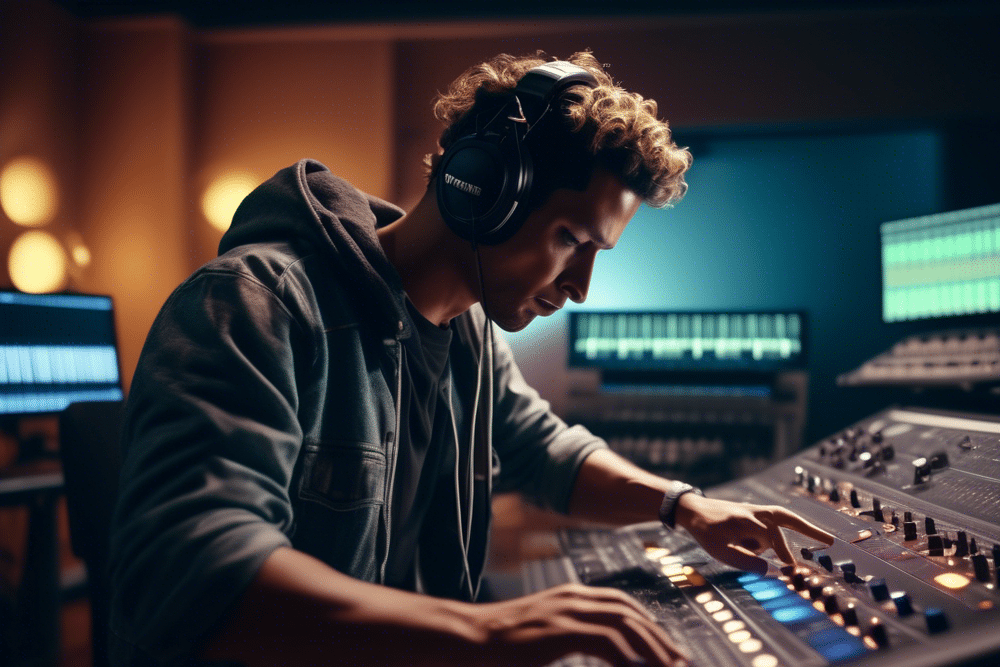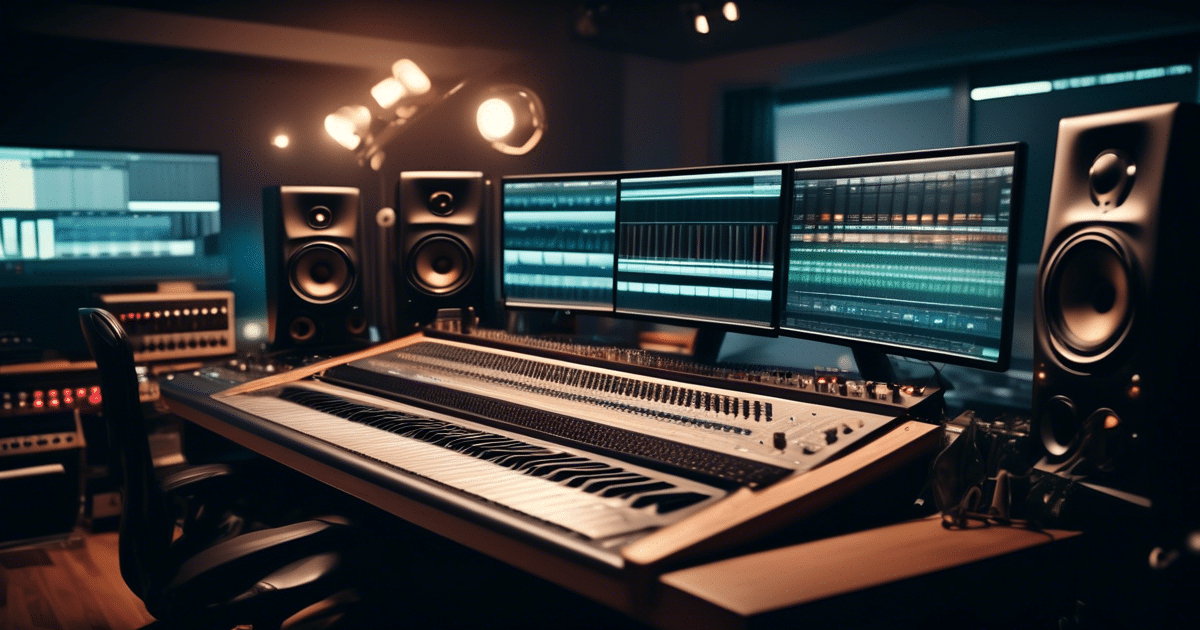Estimated reading time: 9 minutes
Have you ever wondered what goes on behind the scenes of your favorite songs? How do those catchy melodies, thumping beats, and polished vocals come together to create the music that moves you? The answer lies in the fascinating world of music production. In this blog post, we’ll dive deep into the question “What is production in music?” and explore the various aspects that make up this creative and technical process.
Whether you’re an aspiring musician, a curious listener, or someone considering a career in the music industry, understanding music production is key to appreciating the art form and the effort that goes into creating the songs we love. So, let’s embark on this journey to uncover the secrets of music production and gain insights into the role of a music producer.
Table of contents
What is Production in Music?
At its core, music production is the process of creating, recording, and refining a piece of music. It encompasses everything from the initial songwriting and composition to the final mastering of a track. Music production is where creativity meets technical expertise, resulting in a polished and professional-sounding piece of music.
The Evolution of Music Production
Music production has come a long way since the early days of recording. In the past, producing music often meant gathering musicians in a studio, recording their performances onto tape, and then mixing and mastering the recordings. While this traditional approach is still used today, advancements in technology have revolutionized the field.
Today, music production can be done entirely on a computer, using digital audio workstations (DAWs) and virtual instruments. This has made music production more accessible to aspiring producers and musicians, allowing them to create professional-sounding tracks from the comfort of their own homes.
The Role of a Music Producer
When discussing music production, it’s essential to understand the pivotal role of a music producer. But what exactly is a music producer, and what do they do?
What is a Music Producer?
A music producer is like the director of a film, but for music. They oversee the entire process of creating a song or album, from its conception to its final release. Music producers wear many hats and are involved in various aspects of the production process.
Responsibilities of a Music Producer
- Collaborating with artists to develop their sound and vision
- Arranging and composing music
- Selecting and booking session musicians
- Overseeing recording sessions
- Mixing and editing tracks
- Ensuring the project stays within budget and on schedule
- Providing creative input and direction
- Acting as a liaison between the artist and the record label
Record Producer Job Description
A typical job description for a record producer might include:
- Excellent musical knowledge and understanding of various genres
- Strong technical skills in recording, mixing, and mastering
- Ability to work with different personalities and manage a team
- Creative problem-solving skills
- Time management and organizational skills
- Knowledge of music industry trends and business practices

The Music Production Process
Now that we understand what music production is and the role of a music producer, let’s dive into the step-by-step process of creating a song.
1. Pre-production
This is the planning stage where the producer and artist discuss the vision for the project. They might:
- Develop song ideas and concepts
- Create rough demos
- Plan arrangements and instrumentation
- Set a budget and timeline for the project
2. Composition and Songwriting
During this phase, the basic structure of the song is created. This includes:
- Writing lyrics
- Creating melodies
- Developing chord progressions
- Arranging the different sections of the song (verse, chorus, bridge, etc.)
3. Recording
This is where the actual sound is captured. The recording process may involve:
- Recording vocals
- Recording live instruments
- Programming electronic instruments and drums
- Layering different sounds and textures
4. Editing
After recording, the producer will clean up and organize the recorded material:
- Removing mistakes or unwanted noises
- Adjusting timing and pitch of performances
- Comping (selecting the best takes from multiple recordings)
5. Mixing
This is where all the recorded elements are balanced and blended:
- Adjusting volume levels of different tracks
- Adding effects like reverb, delay, or compression
- Creating a stereo image (panning sounds left or right)
- Enhancing the overall sound quality
6. Mastering
The final step in the production process:
- Ensuring consistency across all tracks on an album
- Optimizing the sound for different playback systems
- Preparing the audio for distribution (CD, streaming, vinyl, etc.)

Audio Production Techniques
To bring a musical vision to life, music producers employ a variety of audio production techniques. Here are some common ones:
1. Equalization (EQ)
EQ is used to boost or cut specific frequencies in a sound. This can help instruments sit better in a mix or enhance certain characteristics of a sound.
2. Compression
Compression reduces the dynamic range of a sound, making loud parts quieter and quiet parts louder. This can help create a more consistent and polished sound.
3. Reverb and Delay
These effects add space and depth to a recording, simulating the sound of different environments or creating interesting echoes.
4. Automation
This technique involves programming changes in various parameters (like volume or effects) over time, adding movement and interest to a track.
5. Sampling
Sampling involves taking a portion of one sound recording and reusing it as an instrument or element in a different recording. If you’re eager to experiment with energetic genres like hardstyle, explore our premium Hardstyle Sample Packs to infuse your productions with dynamic, genre-specific sounds.
Music Production Equipment
To bring their creative visions to life, music producers rely on a variety of equipment. Here’s a look at some essential tools:
Hardware
- Computer: The central hub of modern music production
- Audio Interface: Converts analog signals to digital and vice versa
- MIDI Controller: Used to play and control virtual instruments
- Microphones: For recording vocals and acoustic instruments
- Studio Monitors: For accurate playback of your mixes
- Headphones: For detailed listening and recording
Software
- Digital Audio Workstation (DAW): The main software used for recording, editing, and mixing music
- Virtual Instruments: Software versions of instruments that can be played via MIDI
- Plug-ins: Software that adds effects or processing to your audio
Music Production Software
Choosing the right music production software, or DAW, is crucial for any producer. Here are some popular options:
- Pro Tools: Industry standard, especially in professional studios
- Logic Pro: Popular among Mac users, known for its vast library of virtual instruments
- Ableton Live: Favored by electronic music producers and live performers
- FL Studio: Known for its user-friendly interface and beat-making capabilities
- Reaper: A budget-friendly option with powerful features

Setting Up a Home Studio
With advancements in technology, it’s now possible to set up a functional home studio without breaking the bank. Here’s a basic home studio setup:
- Computer: A reasonably powerful laptop or desktop
- DAW: Choose one that fits your needs and budget
- Audio Interface: A simple 2-channel interface is often enough to start
- MIDI Controller: A 25 or 49-key controller is versatile for most needs
- Microphone: A good quality condenser microphone for vocals and acoustic instruments
- Headphones: For monitoring while recording
- Studio Monitors: For accurate mixing (can be added later as you progress)
Remember, you don’t need top-of-the-line equipment to start. Focus on learning to use what you have effectively.
How to Become a Music Producer
If you’re inspired by what you’ve learned and want to pursue a career in music production, here are some steps you can take:
- Study Music Theory: Understanding the basics of music theory will help you communicate with musicians and make informed production decisions.
- Learn a DAW: Choose a digital audio workstation and learn it inside out. Many DAWs offer free trials, so you can experiment before committing.
- Practice, Practice, Practice: Produce as much music as you can. Quantity leads to quality.
- Develop Your Ear: Train yourself to identify different frequencies, effects, and production techniques in the music you listen to.
- Network: Connect with other producers, musicians, and industry professionals. Collaboration is key in the music industry.
- Build a Portfolio: Create a diverse portfolio of your work to showcase your skills to potential clients or employers.
- Consider Formal Education: While not necessary, a degree in music production or audio engineering can provide valuable knowledge and connections.
- Stay Current: The music industry is always evolving. Keep up with new technologies, trends, and techniques.
Music Producer Salary
If you’re considering a career as a music producer, you might be wondering about the potential earnings. It’s important to note that music producer salaries can vary widely based on factors such as experience, location, and the specific area of the industry you work in.
According to data from various sources, the average annual salary for music producers in the United States ranges from $30,000 to $100,000. However, top producers working with major artists can earn significantly more, potentially into the millions.
Keep in mind that many music producers work as freelancers or independent contractors, which means their income can fluctuate from year to year. Additionally, many producers supplement their income by offering services like mixing, mastering, or giving music production lessons.
Video: What is production music?
Conclusion
Music production is a fascinating blend of art and science, creativity and technical skill. It’s the process that transforms raw musical ideas into the polished songs we hear on the radio, in movies, or on our favorite streaming platforms. From understanding what production in music entails to exploring the role of a music producer, the equipment used, and the steps to become one, we’ve covered a lot of ground in this comprehensive guide.
Whether you’re an aspiring producer, a curious music fan, or someone considering a career change, the world of music production offers endless opportunities for creativity and expression. Remember, while the technical aspects of production are important, at its heart, music production is about capturing emotion and connecting with listeners.
So, the next time you listen to your favorite song, take a moment to appreciate not just the artists performing, but also the intricate work of the producers behind the scenes. And if you’re feeling inspired, why not try your hand at music production? With the accessibility of modern technology, the tools to start creating are right at your fingertips. Who knows? You might just be the next big name in music production!
Related Posts
FAQs
It is the creative and technical process of composing, recording, editing, mixing, and mastering music to create a polished final track.
A music producer oversees the entire process—from developing song ideas and recording sessions to mixing and mastering—guiding the project’s creative vision.
It has shifted from traditional studio setups and tape recordings to using digital audio workstations (DAWs) and virtual instruments, making it more accessible.
Key tools include a computer, audio interface, MIDI controller, microphones, studio monitors, headphones, and a Digital Audio Workstation (DAW).
Start by learning a DAW, studying basic music theory, practicing recording and mixing techniques, and building a diverse portfolio of work.
